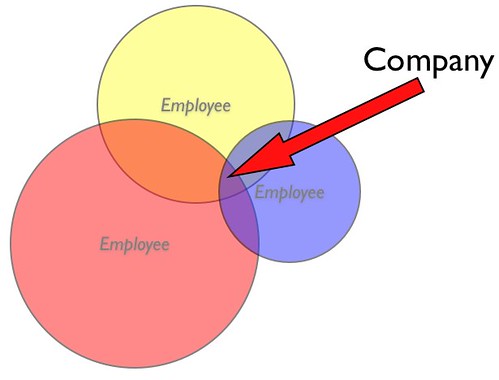Plenty has been written about the pros and cons of employees engaging in social media at work, officially or unofficially. Plenty of people have gained and lost jobs through the judicious or indiscrete usage of social media and new media, but by and large, most corporations haven’t truly accepted full employee participation in new media. Here’s a slightly different perspective on personal brand, personal blogs, and corporate success:
Personal brand is absolutely essential to future corporate success, at least from a marketing perspective.
Here’s why. If you have employees who are already engaged in new media – blogging, podcasting, social channels – then they likely already have and belong to other communities. Some of their interests overlap with their coworkers, but not many.
If we drew a Venn diagram (you remember these from school, yes? Logic class?) of the various personal networks and interests of your employees, you’d get something that looks like this:
That tiny little wedge in the middle is the intersection of personal and corporate networks. Companies that force their employees to rigorously keep personal and professional separate or even require employees not to participate in personal media creation outside of work create and get access to only that tiny little wedge in the middle, and nothing else.
Now imagine that a company, instead of discouraging or trivializing employees’ personal brands, encouraged them to actively grow their own networks, to use and leverage social media and new media to the best of their abilities. Imagine a company so forward-thinking that each employee had their own powerful personal brand and the freedom to express it (as long as said employees weren’t doing anything materially harmful in public).
What would that company’s reach be? Well, instead of the tiny intersection in the middle of those three networks in the chart above, the company’s effective reach would be the sum, the union of all the networks. Each employee’s personal network would contribute to the effective reach of the whole network.
More important, those employees have different audiences than your core corporate audience. For example, look at a few of the employee non-work blogs of the folks over at Radian6:
– Marcel LeBrun
– Amber Naslund
– Lauren Vargas
– Teresa Basich
– Robin Seidner
– Robbie MacCormack
Each of these folks has their own audience. Some of their audience probably doesn’t even know what they do for work. By liberally encouraging their staff to be out and about in new media, Radian6’s reach is much greater than its corporate blog, and its reach extends into different audiences.
What would it take to make this happen? A few things.
On the corporate side:
1. Employee education. Not just about what is or is not professional even in a personal blog (hey, you know that party photo you have in your photo feed…), but also how to build and grow audience, how to communicate effectively, how to create interest in what they’re doing on a personal level.
2. An awesome company with amazing products and services that’s worth talking about. Requiring employees to blog about your company usually falls flat. You shouldn’t have to ask if your employees legitimately love working for you – they’ll do it on their own. You can generally suggest (hey, we’ve got a kickass promotion for new customers, please tell your friends) but you can’t force it on your employees in their personal, non-work spaces.
3. An embrace of the 80/20 rule. Google and 3M are most famous for embedding this rule in their cultures, wherein employees have up to 20% of their schedule freed to experiment, to try new things, to work on stuff that isn’t in the core business objectives list. This includes stuff like personal blogs, networking outside of corporate target audiences, and participation in things that at first glance don’t seem to feed direct ROI numbers. As long as your team is meeting or exceeding their objectives otherwise, let the 80/20 rule operate to bring in the benefits of serendipity.
On the employee side:
1. Employees need to exercise profoundly good judgement at all times, even outside of work. Each of us is in sales. Each of us is in marketing. Each of us is in customer service. Each of us is in public relations. This is true no matter what title is on your business card. Wherever we go, wherever we interact with other people (online or offline) we are ambassadors of the company we work for. Does that mean we’re working 24/7? No. It does mean we’re not a public embarrassment, however. If you’re going to participate in new media in any way, shape, or form, recognize that you are also implicitly representing your employer whether you want to be or not.
2. Employees need to look for opportunities to build business. If an employer implements the 80/20 rule, there’s an informal social contract that effectively says, if you’re allowed to do your own thing and build your own brand using some work time, throw us a bone here and there so that we’re getting an equal exchange of value. Put up a navigation bar link on your blog with our top SEO keyword (hey, look at that shiny email marketing link), mention us if it’s appropriate when the topic of our business comes up in conversation, and refer people to sales if you’ve got a friend who really and truly needs what we have to offer.
3. Don’t feel obligated to participate. At companies where you have highly engaged coworkers, you may be asked or even subtly peer-pressured into doing the same things. Don’t. If your heart isn’t in blogging or Tweeting or creating new media, don’t do it, because the outcome will suck. The outcome will reflect your lack of passion, and your time is better spent doing things you love.
If you can match up the power of personal networks and different audiences with a great company, great products, and talk-worthy stuff, your reach and influence will be magnified far beyond what you have today.
Did you enjoy this blog post? If so, please subscribe right now!
Get this and other great articles from the source at www.ChristopherSPenn.com! Want to take your conference or event to the next level? Book me to speak and get the same quality information on stage as you do on this blog.












